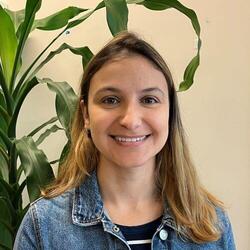Faculty of Science
Department of Biology
 Country of origin: Brazil
Country of origin: Brazil
Academic degrees and Institutions:
-
PhD in Biology - Université du Québec à Montréal, Canada 2020
-
MSc in Ecology - Universidade Federal de Minas Gerais, Brazil 2014
-
BSc in Biological Sciences - Universidade Federal de Minas Gerais, Brazil 2012
Describe your work and how it embodies the nature of the AMTD postdoctoral program.
I will investigate how bacteria that grow on methane (a potent greenhouse gas) are able to do so in the absence of oxygen. Traditionally, methanotrophic bacteria (bacteria that oxidize and grow on methane) are known to depend on oxygen; but recently, scientists have encountered evidence of methane consumption by bacteria in methane-rich but anoxic deep waters of lakes (i.e. in the absence of oxygen). Current predictions indicate that lakes will get warmer and less oxygenated, leading to the question of how methane consumption and thus methane emissions will be affected in these ecosystems. Therefore, the findings from my work could help understand how methane emissions to the atmosphere will be affected in future ecosystems. We expect that current predictive models of methane oxidation will be improved by adding previously unaccounted information on bacterial methane oxidation in the absence of oxygen. Such refinement could lead to more accurate predictions of climate feedback, particularly in methane-producing ecosystems that are undergoing rapid change, such as thawing permafrost in the Arctic and dammed rivers for construction of hydropower reservoirs. Additionally, by elucidating the physiological and genomic features of methanotrophic bacteria in anoxic waters, my work has the potential to open new bioremediation techniques for more effective methane capture in natural and engineered systems.
What are some activities you hope to accomplish during your postdoctoral appointment at University of Waterloo?
- Visibility
- Networking
- Publications
- Teaching experience
Have you been the recipient of any other major or donor-funded awards?
FRQNT PhD scholarship: this scholarship is offered by the government of the province of Quebec (Canada) to foreigner students (Merit Scholarship Program for Foreign Students) and was a game changer in my scientific career. With this scholarship, I did my PhD in one of the strongest groups researching aquatic carbon biogeochemistry in the globe (and probably the most diverse as well). This experience was extremely enriching scientifically and personally and has helped me open doors and make professional connections that have been crucial in my scientific career.
Do you have any relevant academic projects you would like to share?
Ecological Dissertations in the Aquatic Sciences (Eco-DAS): This is a platform of the international Association for the Sciences of Limnology and Oceanography (ASLO) for early career aquatic scientists. Through this platform, I am involved in a couple of collaborative scientific projects with other early career scientists. It has been a great place for learning and sharing skills, generating knowledge together, and creating a supportive network.
Why did you choose the University of Waterloo?
Research excellence and international recognition.
What are you most looking forward to or currently enjoying about University of Waterloo?
Laboratory facilities. Collaborations with students, postdocs, and professors. Campus life.
What do you enjoy doing in your spare time?
Dancing, yoga, and hiking.
LinkedIn profile









